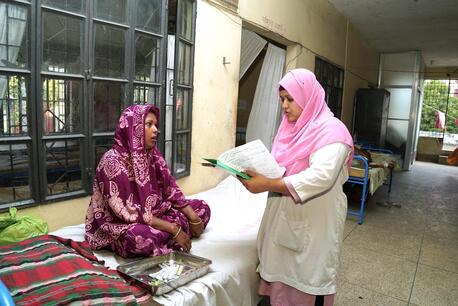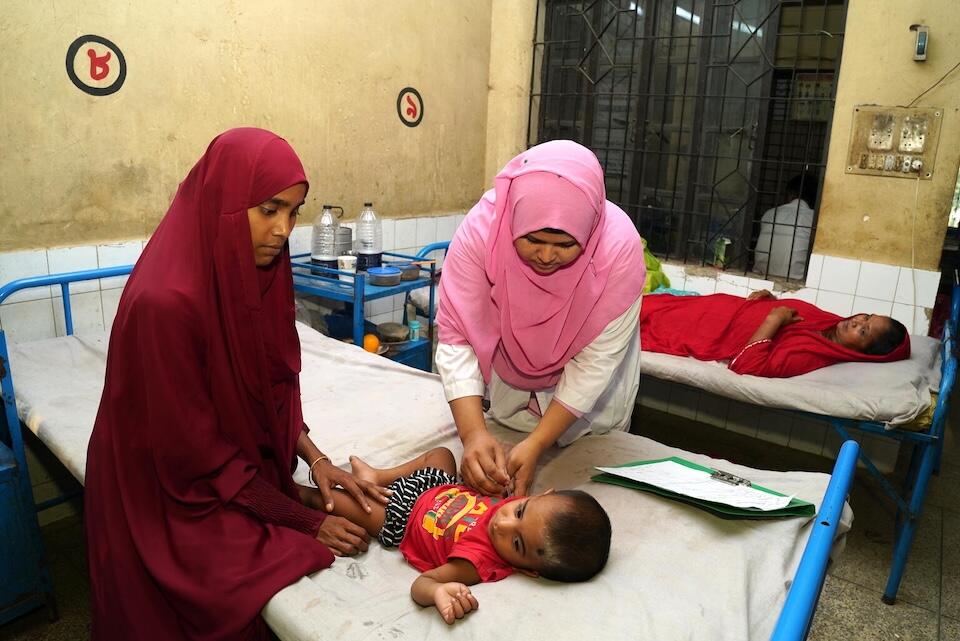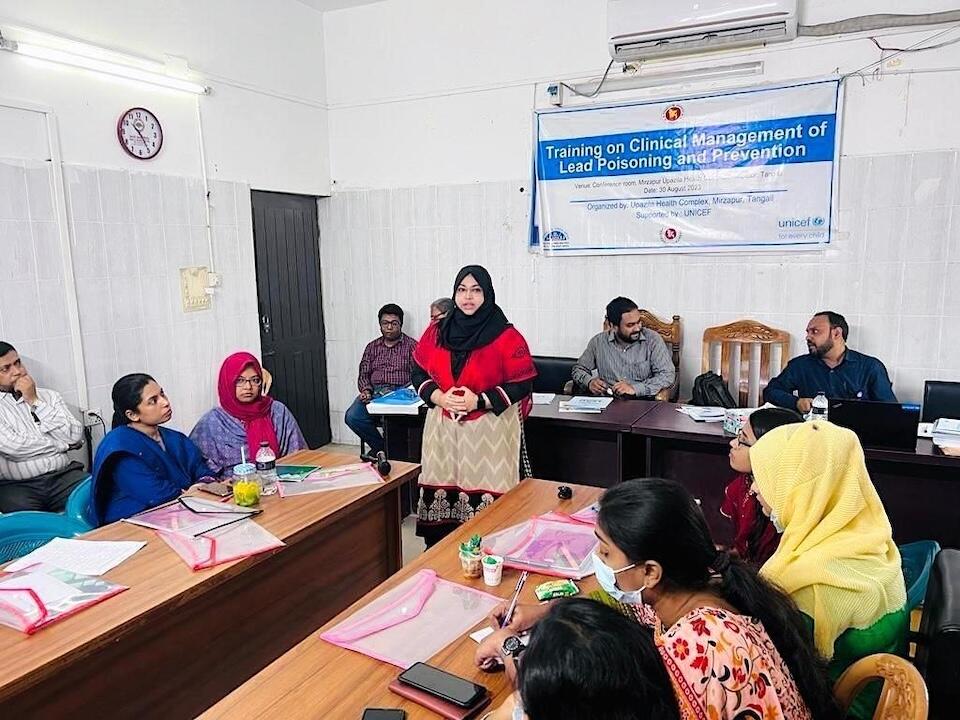
One Midwife's Journey to Combat Lead Poisoning in Rural Bangladesh
Lead poisoning is a silent and pervasive problem, especially in Bangladesh, with devastating effects on children's development and overall health. Midwife Razia Sultana Tania is part of a UNICEF-supported program to strengthen local health systems to more effectively tackle the issue.
How a trained midwife is helping to empower her community with UNICEF's support
Midwife Razia Sultana Tania is the lifeline of the Upazila Health Complex in Zamurki, Mirzapur, in Bangladesh's Tangail district. With specialized training supported by UNICEF, she is not only delivering newborn children but also delivering a healthier future for her community by helping combat lead poisoning.
Razia is part of UNICEF's intensive training program supporting the Ministry of Health and Family Welfare and Directorate General of Health Services. The program is focused on improving health system capacity and readiness to address lead poisoning prevention, which includes equipping health care providers with the knowledge and skills needed to tackle the issue in rural Bangladesh.
An invisible threat
Lead poisoning is a silent and pervasive problem, especially in Bangladesh, with devastating effects on children's development and overall health. It is particularly destructive to babies and children under age 5, because it can cause irreparable harm to children’s brains and hamper their ability to develop fully.
Children are extremely vulnerable to the effects of lead poisoning. However, if parents have the knowledge early on of how to mitigate its effects, their children will live a better life.
Moderate to high levels of exposure can cause children to suffer from headaches, abdominal pain, dullness, loss of memory, poor attention, loss of appetite or constipation. Lead poisoning can also affect neurological processes and the central nervous system, which may result in violent behavior later in life.
Pregnant women are also at risk, with high lead exposure levels resulting in miscarriage, stillbirth, premature birth and low birth weight.
Illegal recycling of used lead acid batteries close to homestead areas is a major source of lead exposure. High concentrations of lead have also been found in spices, for example in lead chromate, which is used to enhance the color and weight of turmeric.
Alarming levels of lead have also been reported in toys, paints, aluminum and ceramic cookware. It has also been detected in some food items.
In Bangladesh alone, it is estimated that 35 million children have blood lead levels that are too high. According to the Institute of Health Metrics Evaluation, Bangladesh has the world's fourth-highest rate of death due to lead exposure.

Empowering frontline health workers
In March 2023, a total of 35 health and education staff were trained as resource persons to support subnational capacity building activities using the recently developed national clinical management guideline on lead poisoning. From May to August 2023, another 379 health care providers received training in four selected districts: Patuakhali, Sylhet, Tangail and Khulna.
Participants included medical doctors, senior staff nurses, sub-assistant community medical officers, medical technologists, health assistants and community health care workers – 46 percent of them women.
The training covered the background and situation of lead poisoning in Bangladesh, principal sources and routes of exposure to lead, understanding the toxicity of lead, diagnosis and management of lead poisoning and preventive measures. The objective of the training was to increase the knowledge of health care providers in lead poisoning management and prevention and to empower them as facilitators and trainers in their respective districts.
A variety of learning methods were used such as interactive presentations, case scenarios, small group discussions, video presentations and pre- and post-knowledge testing.
In addition to health care providers, a wide-ranging network of individuals have been equipped with essential knowledge to combat lead poisoning. Through dedicated efforts, 199 high school teachers, 75 local government representatives, 23 business owners, 33 journalists and 63 motivated youths had received training by the end of August 2023.
These diverse groups have become essential partners in spreading awareness and mobilizing communities, amplifying the collective impact in the fight against lead poisoning.
Previously, lead poisoning was an invisible threat, Now, I can counsel and educate pregnant and new mothers, parents and caregivers on appropriate treatment and prevention.
A voice of prevention
The training transformed Razia's approach to her work. She emerged from the program not only as a health care provider but as a beacon of knowledge and empowerment. With a deep understanding of lead poisoning and how it could affect the communities around her, Razia has become a trusted resource person in the health complex. Her newfound expertise empowers her to educate not only her patients but also her fellow health care professionals, fostering a ripple effect of knowledge and awareness.
Amid her busy schedule, Razia took a moment to reflect on the impact of this training on her community.
"Previously, lead poisoning was an invisible threat," she said. "Now, I can counsel and educate pregnant and new mothers, parents and caregivers on appropriate treatment and prevention."

A transformative partnership
Razia's dedication extends beyond the clinic walls. She has become a passionate advocate for lead poisoning prevention, spreading awareness about the principal sources of lead exposure, such as contaminated water, paint and household items to pregnant and new mothers, making a significant difference in the lives of the families she serves.
UNICEF's support to the government of Bangladesh has been instrumental in enabling health care providers like Razia to become the driving force behind lead poisoning prevention in rural Bangladesh. The combined investment in awareness-raising and capacity-building initiatives has transformed health care professionals into knowledgeable advocates, ensuring that children and communities are safeguarded from this silent but deadly threat and paving the way for a healthier and safer Bangladesh.
This article originally appeared on unicef.org
More than 1 million children under age 5 die every year from preventable environmental risks. Clarios Foundation is supporting UNICEF's work to protect child survival, health and well-being from the impact of climate change and environmental degradation. Together, we believe every child has the right to a healthy environment.
Learn more about what UNICEF is doing to respond to the climate crisis.
Support UNICEF's mission. Donate today.


